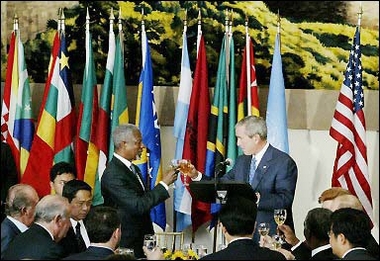|
UN reform on the agenda at UN summit enter second day
(AFP)
Updated: 2005-09-15 21:38
World leaders prepared for a second day of meetings to discuss strategies to combat poverty, terrorism and disease, after Secretary General Kofi Annan conceded that newly adopted UN reforms fell far short of hopes.

US President George W. Bush (R) raises a toast with UN Secretary General Kofi Annan during a luncheon at the 2005 World Summit and 60th General Assembly of the United Nations in New York, September 14, 2005. World leaders prepared for a second day of meetings to discuss strategies to combat poverty, terrorism and disease, after Annan conceded that newly adopted UN reforms fell far short of hopes. [AFP] |
Kings, presidents, prime ministers and other leaders from 170 countries gathered under tight security for the world's largest summit that coincides with the organization's 60th anniversary.
Japanese Prime Minister Junichiro Koizumi, one of Thursday speakers, is expected to make a pitch for the increasingly remote goal of gaining a seat for his country at the UN Security Council.
Japan was one of the losing nations in World War II but now has the world's second largest economy, and believes it deserves a permanent place on the council with the other leading powers.
Japan, Brazil, Germany and India had submitted a plan to boost the council membership to 25, with six new permanent seats and four non-permanent seats.
But the plan died this week, having faced opposition from permanent council members China and the United States and having failed to garner enough support from African nations.
On Wednesday Japanese Foreign Minister Nobutaka Machimura called for reforming the Security Council to include a permanent seat for his country. The reform is needed to "reflect today's reality," Machimura said.
But Chinese President Hu Jintao called for greater representation of developing economies, especially from Africa.
"Developing countries, which make up over two thirds of the UN membership, are obviously underrepresented in the Security Council," he said.
China stood for an enlarged council based on a broad consensus, giving especially the small and medium-sized economies greater access to its decision-making, he said.
Annan opened the three-day summit with a frank assessment of a diluted document on UN reform that the General Assembly adopted after months of wrangling on Tuesday.
"We have not yet achieved the sweeping and fundamental reform that I and many others believe is required," Annan said.
The text boosted the UN commitment to eradicating poverty and genocide and promoting human rights, but was vague on details. It failed to establish an agreed definition of terrorism and left out a chapter on disarmament altogether.
Annan pleaded for renewed confidence in the world body and its capacity to mobilize collective action, making a thinly veiled contrast with the unilateral approach often adopted by the United States.
President George W. Bush delivered a conciliatory speech on Wednesday, in which he said he was ready to scrap all US trade barriers as well as politically crucial agricultural subsidies as long as the rest of the world did so as well.
Bush, who bypassed the United Nations to invade Iraq in 2003, urged the institution to be "strong and efficient, free of corruption and accountable to the people it serves.
"The United Nations must stand for integrity and live by the high standards it sets for others," he said.
Bush pressed for management reforms and renewed Washington's criticism of allowing countries with questionable human rights records on its rights watchdog commission.
Three years after warning that the world body must back the US-led war in Iraq or be irrelevant, Bush appealed for greater cooperation on Iraq, freer trade, and winning the war on terrorism.
Without mentioning them by name, he alluded to US complaints against countries such as Iran, Syria and North Korea, which Washington accuses of sponsoring terrorism.
"We must send a clear message to the rulers of outlaw regimes that sponsor terror and pursue weapons of mass murder: 'You will not be allowed to threaten the peace and stability of the world,'" the president said.
Leaders attending a special UN Security Council session later called on world nations to outlaw incitement to terrorism. They urged that anyone guilty of stirring up terrorist attacks be denied safe haven.
Bush also told the Security Council that the United States would help train more than 40,000 African peacekeepers to "preserve justice and order in Africa."
He underlined a global effort to battle avian influenza and said the United States was ready to scrap "all tariffs and subsidies" and other barriers to trade if other nations agree.
"This is key to overcoming poverty in the world's poorest nations. It's essential we promote prosperity and opportunity for all nations," Bush said, explicitly linking poverty and the rise of terrorism.
Other Wednesday speakers included Iran's new President Mahmoud Ahmadinejad, who lashed out at western "interventionism," but offered no proposals for averting a looming showdown over Tehran's nuclear program.
Without naming countries, Ahmadinejad railed at nations who believe they have a "license" to employ pre-emptive polices in what he branded a "modern manifestation of interventionism and war-mongering."
His remarks came as Washington worked hard to whip up support for referring Iran to the UN Security Council for possible sanctions after Tehran resumed nuclear activities that could be the precursor to a bomb.
|